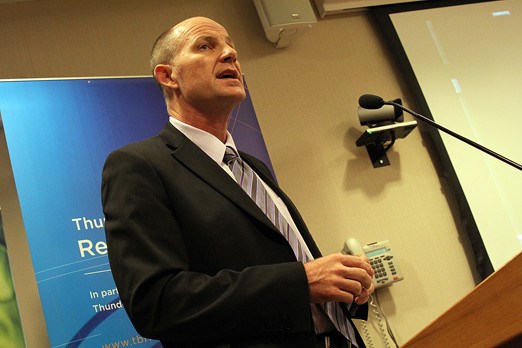The Thunder Bay Regional Research Institute’s star continues to rise.
On Friday TBRRI officials introduced Boston’s Mitch Albert, a former member of the Harvard Medical School faculty, as its latest research chair.
Albert, a specialist in the field of hyperpolarized noble gas MRI and the co-inventor of the technology, said the vision of what the institute is trying to accomplish in imaging research. It’s the perfect setting to move his work forward, he said.
“It uses high power lasers to increase the MRI signal of Xenon and helium by 100,000 times, so you can make exquisite, beautiful images of the lungs,” he said. “This is very important because in Canada, pulmonary disease is the fourth leading killer.
“We really have a chance to do something for the people of Canada. And an important component of my research program is that we’re going to do studies with the Aboriginal population, who have a very high incidences of chronic pulmonary disease.”
Albert said that includes everything from asthma to cystic fibrosis. The technology also allows them to image ventilation function and airways.
“In addition we’re also working with research on hyperpolarized xenon to look at brain function and stroke,” he said.
It’s both preventative and diagnostic in nature, Albert added.
“You can also use these techniques to monitor the progress of therapy,” he said. “If you do therapy, you have to stage it, to see how it’s coming along. So it’s good for that. You can also potentially use it for image-padded therapy.”
Albert wasn’t the only new face introduced on Friday afternoon.
Scott Gillis has been brought on board to serve as TBRRI’s director of business development and commercialization.
The Antigonish, N.S. native, who spent most of his 22-year career with GlaxoSmtihKline, said he wants to work with scientists to help bring their ideas to life and improve life for patients and the financial outlook for Thunder Bay.
“We are in a knowledge-based economy here in Thunder Bay, and I want to be part of that,” he said.
TBRRI CEO Michael Power said the arrival of Albert and Gillis shows just how far the institute has come in the eyes of scientists and the business community at large.
“It shows our ability to attract the best in the world,” Power said.
“We’ve really walked the talk. We’ve invested heavily in excellence. We’ve said no to some really good science. We’ve only said yes to the best. And Mitch Albert is just an outstanding example of our scientific advisory cabinet being able to help us attract the best in the world.”
